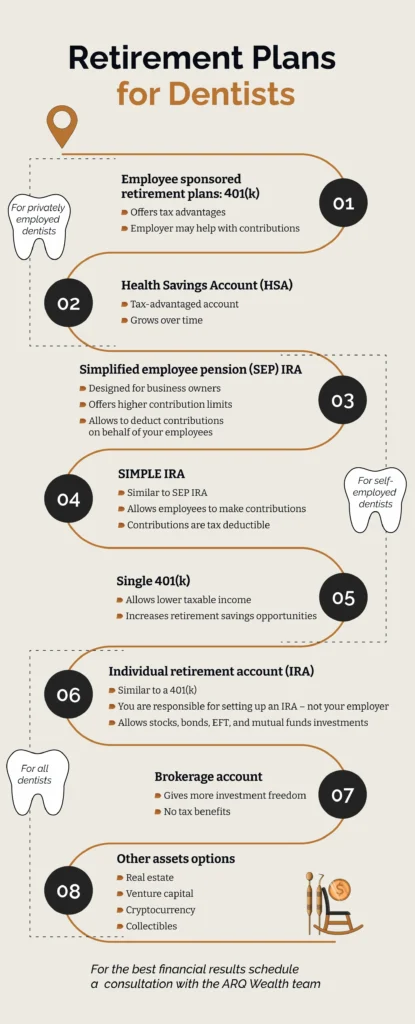Many dental professionals find themselves in a challenging position when it comes to retirement planning. On one hand, most dentists are high earners, with the industry boasting a median salary of $155,040 in 2022. However, dentists must stay in school longer than their peers, resulting in higher student loan debt. Upon entering the workforce, the focus on student loan repayment can cause dentists to delay their financial planning.
Of course, many dentists choose to open up their own dental practice which further complicates their financial planning. This article will explore all of the retirement plans available for both privately employed and self-employed dental professionals.
Retirement Plans for Privately Employed Dentists
These are the best financial planning options if you’re a private employee who works at another practice.

Employee Sponsored Retirement Plans: 401(k)
If you’re an employee of a large company, then the easiest starting point is to explore any employer-sponsored retirement plans that they might offer. The most common plan is a 401(k), which lets you contribute a portion of your wages to an investment account.
These accounts are typically tied to stock market investments so that the balance grows over time. There are two main benefits to using a 401(k) to help with your financial planning:
- You’ll enjoy tax advantages: Contributions to a 401(k) are considered “pre-tax,” meaning the money goes into your retirement account before it gets taxed. With this in mind, you can legally reduce your taxable income by contributing more money to your 401(k). However, this means that you will have to pay tax on your withdrawals.
- Your employer may help you with contributions: As a perk to their employees, many employers offer an “employer match” program. This is where employers will “match” contributions that their employees make to their retirement plans. So, if you contribute $5,000 to your retirement account then your employer contributions will be $5,000 – for a total of $10,000. However, not all employers offer this perk.
In 2024, the IRS raised the contribution limit for employees who participate in 401(k) plans to $23,000.
Health Savings Account
Another financial planning account that your employer may offer is a health savings account (HSA). An HSA is a tax-advantaged account that can help you pay for medical expenses. With these accounts, you contribute a certain amount of money to your account where it gets invested and grows over time. You can then leverage this fund to help pay for qualified expenses like medical, dental, vision care, and prescription drugs.
HSAs are not technically retirement accounts. These financial planning accounts offer another way to save up money that’s specifically meant to be used for medical expenses. Leveraging this plan can help you stay prepared for emergencies and protect your core nest egg from getting used for medical expenses.
In 2024, the HSA contribution limit is $4,150 if you have health coverage just for yourself or $8,300 if you have coverage for your family.
Retirement Plans for Self-Employed Dentists
If you are a dental practice owner, the following plans can help you with your financial planning. However, we’d recommend speaking with a dental financial advisor as they will be able to help you structure your dental practice in the best way possible.
Simplified Employee Pension (SEP) IRA
A SEP is a retirement account that uses the same rules as a traditional IRA but is designed for business owners, making it perfect for dental practice owners. These accounts have higher contribution limits and, as of 2024, you can contribute 25% of compensation or $69,000, whichever is less.
If your practice has employees then you can also set up a SEP on behalf of your employees. This allows you to deduct the contributions that you make on behalf of your employees from your income. However, employees are not able to make their own contributions.
SIMPLE IRA
A SIMPLE IRA is very similar to a SEP IRA except that it allows employees to make their own contributions. As a dental practice owner, this can reduce the burden of making all of the contributions on behalf of your employees.
You’ll still need to contribute to their accounts and will typically be required to match each employee’s contributions on a dollar-for-dollar basis up to 3% of that employee’s compensation. As of 2024, SIMPLE IRAs have a contribution limit of $16,000.
All of the contributions made towards a SIMPLE IRA are tax deductible. This can help your business or employees push their income into a lower tax bracket.
Again, SEP and SIMPLE IRA plans are very similar. The best way to learn which one is right for you is by speaking with a certified financial planner.
Single 401(k)
A single 401(k) is perfect for dental practices where the dental practice owner acts as both an employee and the employer, as this plan allows them to make contributions in both capacities:
- Elective deferrals up to 100% of compensation (“earned income” in the case of a self-employed individual) up to $23,000 in 2024.
- Employer nonelective contributions up to 25% of compensation as defined by the plan.
For 2024, the total contributions to a participant’s account cannot exceed $69,000. Opening a single 401(k) plan can be a very strategic move for small business owners, as it essentially allows them to minimize their taxable income while maximizing their retirement savings. However, this strategy is a bit more nuanced than others, which is why we’d recommend speaking with a financial planner before proceeding.
If you think that this plan might be a smart move for you then please schedule a consultation with one of the certified financial planners on the ARQ Wealth team today.
Retirement Plans for All Dentists
The following retirement plans can be great options for all dental professionals – regardless of whether you own a dental practice or are privately employed.
Individual Retirement Account
An individual retirement account (IRA) is a great option when it comes to retirement planning. An IRA is fairly similar to a 401(k), except that you are responsible for setting up an IRA – not your employer. Luckily, setting up an IRA is as simple as creating an account with a financial institution.
Anyone is able to open an IRA, even if you already have a 401(k). These plans allow you to invest in a range of assets including stocks, bonds, ETFs, and mutual funds. There are a few main types of IRAs for privately employed dentists:
- Traditional IRA: This retirement account lets you invest in a wide range of assets. Contributing to a traditional IRA can help you reduce your taxable income. However, your earnings will be taxed when you eventually make a withdrawal from your account.
- Roth IRA: A Roth IRA is also a great choice for all dentists, regardless of your employment status. The biggest difference with a Roth IRA is that you contribute after-tax dollars. This means that your contributions and earnings can grow tax-free, and you can withdraw them tax-free and penalty-free after age 59½.
Even if you already have a 401(k) or similar retirement plan, it can be a wise move to open an individual retirement account. Doing this helps you take more control over your retirement planning, instead of placing all of your trust in your employer.
Open Your Own Brokerage Account
Another option when it comes to retirement planning is to simply open a brokerage account and buy stock, bonds, and other assets on your own. After all, there is no law saying you are required to use a designated retirement account. Opening your own brokerage account comes with one major upside, as well as one major downside:
- You’ll have more investment freedom: When you open your own investment account, you’ll have full control over the assets that you buy and the investment strategy that you use. This means that you can take a more aggressive approach to your investing, should you choose.
- You won’t receive tax benefits: The drawback to using your own investment account is that you will not receive any tax benefits. With this in mind, you’ll likely end up paying significantly more in taxes over time than if you were to use a designated retirement plan.
As a high earner, it may be a good idea to open your own brokerage account as you will likely be held back by the contribution limits of IRAs and 401(k) plans. Opening your own account will allow you to continue saving for the future – even if you’ve maxed out your retirement plans.
When managing your investments, it’s crucial to have a strategy that aligns with your risk tolerance and financial goals. A Managed Brokerage account with ARQ Wealth can provide personalized investment options, helping you navigate the complexities of the market with the guidance of a financial advisor. Reach out today to learn more.
Explore Other Assets
Opening a retirement plan is a great start to your financial planning. But, if you have more aggressive financial goals – such as reaching financial independence – you may want to consider getting a bit more creative with investment options. Again, speaking with a certified financial planner can help provide more insight into your options.
Real estate
Owning real estate is a great investment as it both appreciates in value and generates cash flow. If you’re looking for another way to diversify your financial planning, buying a rental property, apartment, home, or similar piece of real estate can be a great idea.
Real estate is particularly attractive for dental practice owners as you can potentially buy the real estate beneath your practice. Doing this will allow you to partake in the appreciation of the land over time – essentially building your practice into your retirement plan.
That said, you may want to consult with a financial advisor before doing so as this strategy requires a bit more risk management than other retirement plans in this article.
Alternative Assets
Alternative assets, such as venture capital, cryptocurrency, or even collectibles, can also be used as part of your financial planning process. Most financial advisors do not typically view these assets as retirement plans. But, they can still appreciate in value over time and help you diversify your retirement funds across different vehicles.
We hope that you’ve found this article valuable when it comes to learning about the best retirement plans for dental professionals. Interested in getting a more customized dentist retirement plan? If so, please schedule a consultation with a certified financial planner at ARQ Wealth today for more investment advice.


